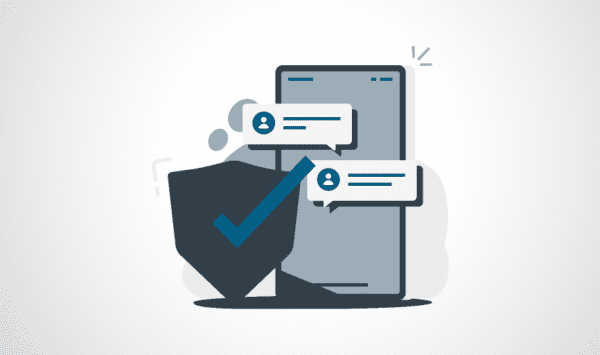
The Center for Media Engagement (CME), in collaboration with Omidyar Network, hosted a RightsCon 2022 session on encrypted messaging apps (EMAs) and their global use for political propaganda, mis- and disinformation, activism, and news (video here). The session featured expertise from Zelly Martin, a Ph.D. student at The University of Texas at Austin (UT) and graduate research assistant at CME, Dima Samaro, a licensed lawyer and the MENA Regional Researcher & Representative at the Business & Human Rights Resource Centre, and Azza El Masri, a Ph.D. student at UT, fellow at CME, and journalist and digital security consultant. Inga Kristina Trauthig, a senior researcher at CME Lab, served as moderator.
The panelists addressed three main topics: (1) The continued importance of encryption for activism; (2) the incorporation of EMAs into state propaganda efforts, and (3) the complexities around the future of EMAs due to demands for content moderation and access.
Samaro drew a line from the Arab Revolts in 2011 to more recent mobilization for protests against corruption in Lebanon, outlining the importance EMAs had and continue to have for activists’ communication. While EMAs were originally designed for one-on-one or one-on-many communication (not news consumption or reaching a critical mass for protest mobilization), they became integral tools for the latter as security grew more important for activists. Among the politically active, understanding spread that encryption offers a way to evade authorities. In 2022, however, government authorities often meddle in EMAs – infiltrating groups and channels to disrupt and confuse people before the messages reach critical masses. Still, the most effective tools at the government’s disposal are legislative measures. Several countries in the MENA region are discussing legislation that includes criminalizing encryption. Tunisia has dropped their attempt, but Egypt made encryption illegal and Iran is undertaking the Internet Bill, which would even forbid the use of VPNs and make access to popular platforms among Iranian citizens impossible.
The popularity and wide reach of EMAs around the globe makes them targets for state propaganda as well. In the Philippines, for example, CME researcher Martin interviewed people in President Duterte’s communications office who reported using Facebook Messenger to “blast” information to the public. They showed their Viber chats with more than 2 million citizens, which they used to project unequivocally positive images about Duterte. With regard to EMAs, CME researchers also came across another established tactic where external propagandists are hired via third-parties to spread state propaganda and provide the state plausible deniability. Intimately tied to the closed nature of EMAs is that people often unknowingly or unintentionally spread propaganda, as they often receive this political content in small groups or from friends or family and are therefore less suspicious of its origin. Many of the people we spoke to said that chat apps, alongside open social media, are their main sources for news in their countries. Thus, chat apps are mobilized to spread propaganda from traditional media and into traditional media, as well as on social media and public discourse writ large, in large part because information appears to be coming from trusted sources and may appear apolitical. This allows for chat apps to become hotbeds of misinformation where propaganda spreads between trusted sources and beyond. In a poll to gather impressions from the people who dialed into our RightsCon panel, participants shared that they have come across misinformation on EMAs that was often shared by friends and family.
The use of EMAs for political propaganda, mis- and disinformation, and human rights abuses could make content moderation in these spaces important. However, El Masri clarified why content moderation as it currently operates on more open social media platforms, like Facebook and Twitter, cannot be applied indiscriminately to encrypted spaces. In order to both reduce harm and safeguard privacy for marginalized groups, human rights defenders, journalists, and NGOs who rely on encryption to mobilize, content moderation on EMAs must emphasize user agency, intentionally designed reporting systems, and communicate disclosures and policies effectively. This is made difficult by disparate operational structures (for instance, WhatsApp saves metadata on its servers, while Signal does not). Furthermore, the use of spyware technology by countries such as Saudi Arabia and the UAE to break encryption endangers the existing safety attached to E2EE. Paired with draconian legislation that threatens the work of journalists and NGOs, such as that of Egypt and Tunisia, activists’ and human rights defenders’ work and safety are at risk.
Finally, the need for human-powered (or at least human-supported) and contextually-driven content moderation is especially important in parts of the Global South as content is more difficult to moderate with automation and dangerous speech can become harmful more quickly than in more stable, democratic Western contexts. Platforms should understand and valorize the labor of fact-checking organizations and human rights defenders who try to make EMAs safe spaces for information sharing, mobilization, organization, and mutual aid while mitigating harms such as the use of chat apps for human rights abuses and the spread of disinformation. Legislation that will effectively break encryption, such as proposed EU Regulations, will only intensify already enacted surveillance strategies against journalists, activists, and government officials in both the Global North and Global South (i.e., Pegasus) by democratic and less democratic governments alike. Less democratic governments are likely to use this legislation as inspiration, but those in so-called stable democracies are not immune. These actions would threaten the safety and free speech of activists and human rights defenders across the globe rather than mitigate harm.
In sum:
- EMAs are crucial for activists living under authoritarian regimes, as well as for NGO workers and journalists around the world;
- EMAs are co-opted by state actors to spread propaganda;
- Authoritarian states are aiming to break encryption by utilizing spyware and proposing or enacting infringing legislation;
- EMA content moderation should address all of these issue at once, by centralizing user agency, to mitigate harms while protecting free speech and security for those who rely on encryption the most.



